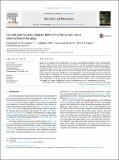Files in this item
Sex and pairing status impact how zebra finches use social information in foraging
Item metadata
| dc.contributor.author | Templeton, Christopher N. | |
| dc.contributor.author | Philp, Katharine | |
| dc.contributor.author | Guillette, Lauren M. | |
| dc.contributor.author | Laland, Kevin N. | |
| dc.contributor.author | Benson-Amram, Sarah | |
| dc.date.accessioned | 2017-04-17T15:30:13Z | |
| dc.date.available | 2017-04-17T15:30:13Z | |
| dc.date.issued | 2017-06 | |
| dc.identifier.citation | Templeton , C N , Philp , K , Guillette , L M , Laland , K N & Benson-Amram , S 2017 , ' Sex and pairing status impact how zebra finches use social information in foraging ' , Behavioural Processes , vol. 139 , pp. 38-42 . https://doi.org/10.1016/j.beproc.2016.12.010 | en |
| dc.identifier.issn | 0376-6357 | |
| dc.identifier.other | PURE: 248483777 | |
| dc.identifier.other | PURE UUID: 548237f4-8023-4f3a-b21e-b5aac0388e48 | |
| dc.identifier.other | RIS: urn:EC45913C82B3FD6E3EFFB0E8F90D9461 | |
| dc.identifier.other | PubMed: 28013062 | |
| dc.identifier.other | Scopus: 85008214358 | |
| dc.identifier.other | ORCID: /0000-0002-2457-0900/work/60630350 | |
| dc.identifier.other | WOS: 000401205100007 | |
| dc.identifier.uri | https://hdl.handle.net/10023/10622 | |
| dc.description | This research was funded by fellowships from NERC (NE/J018694/1) to CNT and BBSRC (BB/M013944/1) to LMG and grants from Royal Society (RG2012R2), MJ Murdock Charitable Trust (2014199), BBSRC (BB/I007997/1 and BB/M013944/1), and ERC (ERC-2008-AdG). | en |
| dc.description.abstract | Many factors, including the demonstrator’s sex, status, and familiarity, shape the nature and magnitude of social learning. Given the important role of pair bonds in socially-monogamous animals, we predicted that these intimate relationships would promote the use of social information, and tested this hypothesis in zebra finches (Taeniopygia guttata). Observer birds witnessed either their mate or another familiar, opposite-sex bird eat from one, but not a second novel food source, before being allowed to feed from both food sources themselves. Birds used social information to make foraging decisions, but not all individuals used this information in the same way. While most individuals copied the foraging choice of the demonstrator as predicted, paired males did not, instead avoiding the feeder demonstrated by their mate. Our findings reveal that sex and pairing status interact to influence the use of social information and suggest that paired males might use social information to avoid competing with their mate. | |
| dc.format.extent | 5 | |
| dc.language.iso | eng | |
| dc.relation.ispartof | Behavioural Processes | en |
| dc.rights | © 2016 The Authors. Published by Elsevier B.V. This is an open access article under the CC BY license (http://creativecommons.org/licenses/by/4.0/). | en |
| dc.subject | Monogamy | en |
| dc.subject | Pair-bond | en |
| dc.subject | Social information | en |
| dc.subject | Social learning | en |
| dc.subject | QH301 Biology | en |
| dc.subject | NDAS | en |
| dc.subject.lcc | QH301 | en |
| dc.title | Sex and pairing status impact how zebra finches use social information in foraging | en |
| dc.type | Journal article | en |
| dc.contributor.sponsor | NERC | en |
| dc.contributor.sponsor | BBSRC | en |
| dc.contributor.sponsor | The Royal Society | en |
| dc.contributor.sponsor | BBSRC | en |
| dc.contributor.sponsor | European Research Council | en |
| dc.description.version | Publisher PDF | en |
| dc.contributor.institution | University of St Andrews. School of Biology | en |
| dc.contributor.institution | University of St Andrews. Scottish Oceans Institute | en |
| dc.contributor.institution | University of St Andrews. Institute of Behavioural and Neural Sciences | en |
| dc.contributor.institution | University of St Andrews. Centre for Social Learning & Cognitive Evolution | en |
| dc.contributor.institution | University of St Andrews. Centre for Biological Diversity | en |
| dc.identifier.doi | https://doi.org/10.1016/j.beproc.2016.12.010 | |
| dc.description.status | Peer reviewed | en |
| dc.identifier.url | http://www.sciencedirect.com/science/article/pii/S037663571630420X | en |
| dc.identifier.grantnumber | NE/J018694/1 | en |
| dc.identifier.grantnumber | BB/M013944/1 | en |
| dc.identifier.grantnumber | NF120136 | en |
| dc.identifier.grantnumber | BB/I007997/1 | en |
| dc.identifier.grantnumber | ERC-2011-AdG | en |
This item appears in the following Collection(s)
Items in the St Andrews Research Repository are protected by copyright, with all rights reserved, unless otherwise indicated.

